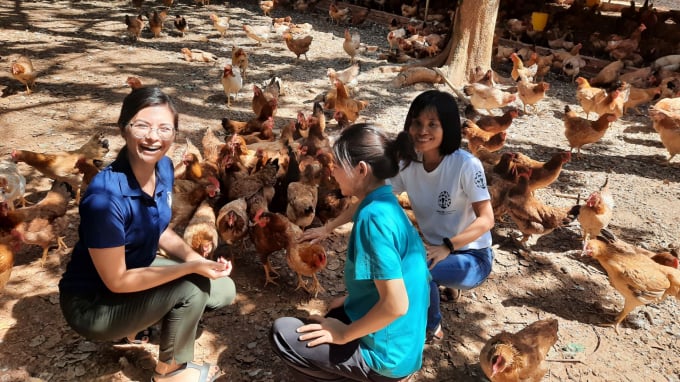May 19, 2025 | 23:28 GMT +7
May 19, 2025 | 23:28 GMT +7
Hotline: 0913.378.918
May 19, 2025 | 23:28 GMT +7
Hotline: 0913.378.918

The social enterprise worked with Humane Society International, a leading global animal protection organization, on the adoption of this policy. By working and supporting its farmer networks, HealthyFarm’s new policy will help to improve the lives of up to 10,000 hens this year. HeathyFarm will focus on growth and expansion in the years to come.
Established in 2016 in Danang, HealthyFarm is a social enterprise focusing on food sustainability including natural farming practices and upholding animal welfare. The enterprise seeks to protect public health while maintaining low environmental impact. HealthyFarm’s mission is to bring clean, safe and natural food to consumers while simultaneously supporting the local farmers and local communities.
After nearly five years of operation, HealthyFarm has distributed more than half a million free-range eggs to both wholesale and retail channels.
Starting from 2020, the social enterprise has been partnering with HSI and World Animal Protection to develop networks of small-scale producers from rural communities to fulfill its commitment to serve 100% cage-free eggs in its stores and to its business customers. This is one of HealthyFarm’s most dedicated projects as it matches the organization’s mission.
Additionally, HealthyFarm is planning several consumer engagement events to raise awareness about cage-free eggs and animal welfare across Vietnam.
Dr. Kasia Weina, founding partner and director of HealthyFarm, stated: “We are excited to take the next steps towards sustainable, responsible consumption that highlights ethical treatment of animals throughout our supply chain. We aim to pioneer this movement and continue to raise awareness and facilitate change surrounding this issue.”
Hang Le, corporate outreach manager for HSI/Vietnam, stated: “We applaud HealthyFarm for joining hundreds of food companies around the globe in pledging to source only cage-free eggs, and we invite other companies to do the same. Through commitments like these, consumers and the food industry in the country are sending a clear message: Immobilizing egg-laying hens in cages is unacceptable, and the days of not questioning how animals are treated in the food industry are long gone. The future of egg production is cage-free, and we look forward to continuing to work with HealthyFarm on the implementation of this policy.”
In Vietnam, the vast majority of egg-laying hens are confined in wire battery cages, where each hen has less space than an A4-sized sheet of paper to spend her entire life. Battery cages are inherently cruel — hens are unable to move freely or express important natural behaviour, including nesting, perching and dustbathing. Cage-free systems generally offer hens higher levels of animal welfare than battery cage systems.
HealthyFarm joins other multinational companies that have made similar global cage-free egg commitments that apply to Vietnam and the rest of Asia, including 4P’s Corporation, AccorHotels, Hilton Hotels and Resorts, Nestle, Sodexo and Mondelez International, among others.
![Reducing emissions from rice fields: [Part 1] Farming clean rice together](https://t.ex-cdn.com/nongnghiepmoitruong.vn/608w/files/news/2025/05/05/z6509661417740_a647202949c539012a959e841c03e1d3-nongnghiep-143611.jpg)
(VAN) Growing clean rice helps reduce environmental pollution while increasing income, allowing farmers to feel secure in production and remain committed to their fields for the long term.
/2025/05/19/5136-1-144800_230.jpg)
(VAN) The Nghe An Provincial People's Committee has just approved the list of beneficiaries eligible for revenue from the Emission Reductions Payment Agreement (ERPA) in the North Central region for the year 2025.

(VAN) 14 out of 35 domesticated elephants in Dak Lak province have had their living conditions improved, with 11 of them currently participating in the non-riding elephant tourism model.

(VAN) Muong Nhe Nature Reserve hopes that being upgraded to a national park will lay the foundation for forest protection efforts to be carried out in a systematic, modern, and sustainable manner.
/2025/05/16/3923-2-171845_52.jpg)
(VAN) Lower costs, higher yields, and improved soil quality are outstanding benefits that soybeans bring when integrated into the crop rotation system.

(VAN) The 'For a Green National Environment' programme aims to promote a green lifestyle, support businesses in implementing ESG practices, and turn Net Zero commitments into concrete actions.

(VAN) Cold-barn systems efficiently manage environmental and temperature conditions, which aids in the prevention of respiratory diseases in pigs and protects them from the vectors that transmit African swine fevers.